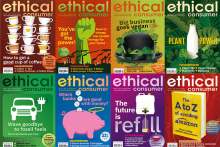It’s long been recognised that consumer boycotts play a key role in the fight against ethically dodgy companies. But should we expect pioneering ethically-focused companies to join in the same consumer boycotts and say ‘no thanks’ to dodgy companies too?
This, in essence, was the question that an Ethical Consumer reader recently asked the Fairtrade coffee producer Cafédirect. Our reader was surprised to find that the company, which is consistently named as an Ethical Consumer Best Buy, sells its coffee on Amazon.
Accusations of industrial-scale tax avoidance, continual violations of workers’ rights and unfair business practices have all been levelled against the global online retailer. The result is that, in 2019, Amazon scooped first prize in Ethical Consumer’s 30th anniversary readers’ poll as the most unethical company of the past 30 years.
So, given Amazon’s evidently unethical track record, should an ethical company like Cafédirect have anything to do with the likes of Amazon?
Here’s the statement that Cafédirect sent to our reader:
"Selling on Amazon gives us the opportunity to reach more customers around the world. As a social enterprise that gives 50% of its profits back, the more customers we reach, the more profits we can share with our growers and their communities."
It’s a compelling argument, for the reality is that ethics are rarely black and white, and here Cafédirect are clearly employing a healthy dose of commercial pragmatism.
Gav Lawson from THTC organic clothing company agrees with Cafédirect.
“I wouldn’t judge companies like Cafédirect for selling on Amazon and I totally see it from their point of view as they’re looking out for their coffee farmers,” says Lawson whose company is also an Ethical Consumer Best Buy.
This ‘means justifies the end’ line is also used by Tony Rollinson from Permaculture Magazine to explain why 50% of their book sales now come from Amazon:
“I wouldn’t choose to use Amazon myself, but as a business we need to be where most people can easily find us,”
says Rollinson whose books are aimed at helping to solve the climate and nature crises engulfing the planet. “We need more people wanting to make changes right now, so we need to be where people naturally go online and where people can find us to buy our stuff.”







